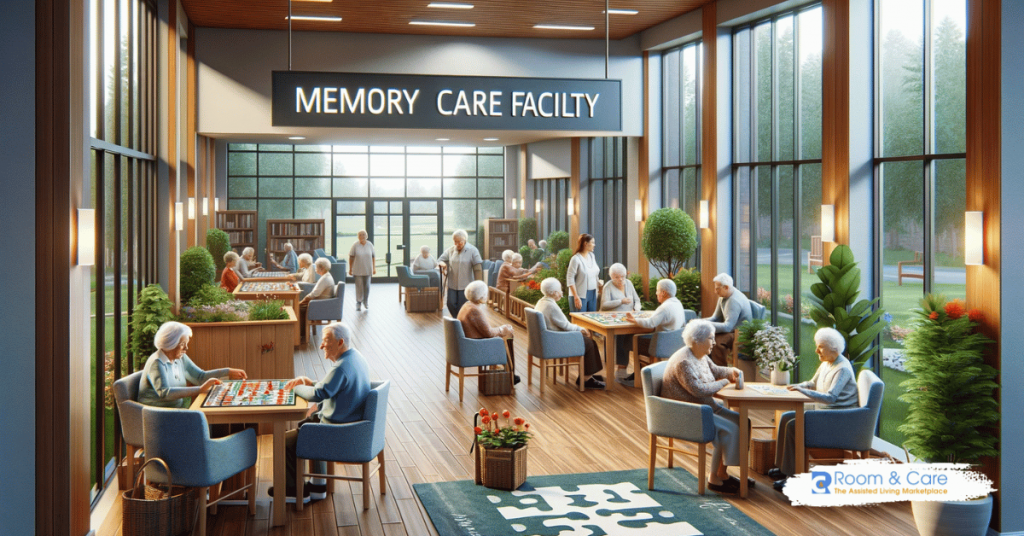

Memory care facilities are a crucial aspect of the healthcare system, especially in regions with a significant aging population like Washington State. These specialized facilities offer tailored care and support to individuals with memory impairments, primarily due to conditions like Alzheimer’s and other forms of dementia. As the senior population grows, the importance and demand for quality memory care services increase correspondingly.
Washington State, mirroring national trends, is witnessing a rise in the number of individuals requiring memory care. According to the Alzheimer’s Association, as of early 2023, approximately 120,000 residents aged 65 and older in Washington were living with Alzheimer’s disease. This figure is expected to grow, highlighting the increasing need for specialized memory care facilities. In Washington, there are over 800 memory care facilities specially equipped and staffed to address the needs arising from dementia.
The average cost of memory care in Washington is notably variable, largely influenced by location. Overall, memory care in Washington averages around $7,500 per month. However, costs can significantly differ based on the city. For instance, in Seattle and Tacoma, the average costs are among the highest, reaching approximately $99,000 annually. In contrast, Spokane and surrounding areas offer more affordable memory care options, with average costs around $79,200 per year. These costs often represent an add-on to existing adult family home, assisted living, or skilled nursing facility expenses, with additional charges for memory care ranging from $975 to $1,700 per month.
Memory care facilities in Washington boast staff who are not only proficient in general elder care but also receive specialized training for assisting residents with Alzheimer’s and dementia. Such training is essential for handling the unique challenges of memory impairments, including behavioral changes and communication issues.
Facility safety is a primary concern, with designs aimed at preventing wandering, a common issue among those with dementia. Secure exits and safe wandering areas are standard features in these facilities, ensuring resident safety while promoting a sense of independence.
The care services in Washington’s memory care facilities extend beyond basic assistance. They include help with daily activities like dressing, eating, and bathing, customized to suit each resident’s abilities. This individualized approach helps maintain as much independence as possible, while providing necessary support.
Nutritional care is a critical component in memory care facilities. These facilities provide nutritious meals tailored to meet the specific dietary requirements of elderly residents with memory impairments. The goal is to ensure nourishment and make mealtimes a socially engaging and cognitively stimulating experience.
In Washington, memory care services are available not only in dedicated facilities but also as integrated options in various senior living arrangements, as long as the facilities meet requisite licensing and certification standards. This flexibility allows families to select the most suitable living situation for their loved ones.
As the number of seniors with memory impairments increases, the landscape of memory care in Washington continues to evolve, underscoring the need for specialized, high-quality care. Understanding the unique offerings of these facilities, from skilled staffing to tailored care services, is crucial for families in search of the best care options for their loved ones.

The infrastructure of memory care facilities in Washington is meticulously designed to cater to the specific needs of residents with memory impairments. These facilities are more than just living spaces; they are environments crafted to enhance safety, comfort, and cognitive engagement.
Memory care facilities in Washington are characterized by their secure and navigable layouts. Key safety features include:
Secured Exits: To prevent wandering, a common behavior in individuals with dementia, exits are securely monitored and equipped with alarms.
Easy-to-Navigate Layouts: Clear signage and uncomplicated floor plans help reduce confusion and anxiety among residents.
Safe Outdoor Areas: Enclosed gardens and walking paths allow residents to enjoy the outdoors safely.
Such design elements are critical in creating a secure yet homely environment for residents with memory disorders.
Many facilities in Washington are integrating technology to enhance resident care, including:
Monitoring Systems: Advanced systems to ensure resident safety without being intrusive.
Therapeutic Technologies: Tools like memory games and VR experiences to aid cognitive stimulation.
This blend of traditional care with modern technology represents the evolving landscape of memory care facilities in Washington.
Specialized care is the cornerstone of memory care facilities in Washington. These services are tailored to meet the unique needs of individuals with memory impairments.
Each resident receives a care plan customized to their specific needs and stage of memory impairment. This plan covers:
Medical Management: Regular health assessments and medication management.
Daily Living Assistance: Help with activities such as bathing, dressing, and eating.
Caregivers in Washington’s memory care facilities are not only qualified but also have specialized training in dementia care, equipping them to handle the complex needs of residents effectively.
The amenities and services offered in Washington’s memory care facilities play a significant role in the well-being of residents.
Facilities offer various activities designed to promote cognitive health and social engagement, such as:
Art and Music Therapy: These therapies stimulate memory and provide emotional relief.
Group Activities: Social events and group exercises to encourage community building.
Residents have access to:
Physical Therapy: To maintain physical health and mobility.
Nutritional Meals: Tailored diets to ensure proper nutrition and cater to dietary restrictions.
The infrastructure, specialized care services, and amenities of memory care facilities in Washington are carefully crafted to provide a supportive, engaging, and safe environment for residents with memory impairments. These facilities are continuously evolving, integrating innovative approaches and technologies to enhance the quality of life for their residents.
The quality of care in memory care facilities in Washington State is heavily influenced by the qualifications of the staff and the resident-to-caregiver ratios. These factors are crucial in ensuring that each resident receives the personalized and attentive care they need.
Staff working in memory care facilities in Washington are required to have specific qualifications and training. This includes:
Educational Requirements: Caregivers often have a background in healthcare, psychology, or social work.
Specialized Training: Staff receive training in dementia care, including understanding the progression of memory disorders and effective communication strategies.
Ongoing Education: Many facilities mandate regular training sessions to keep staff updated on the latest care techniques and insights into dementia care.
The resident-to-caregiver ratio in memory care facilities is a critical metric that impacts the quality of care. While specific ratios can vary depending on the facility and the level of care required, facilities in Washington typically maintain:
Ratios: Many facilities aim for a ratio of around 1 caregiver for every 5 to 8 residents. This ratio allows caregivers to provide more individualized attention and respond promptly to residents’ needs. The ratios may vary depending on the type of Facility it is. A Nursing Home that also specializes in Memory Care will typically have a higher ratio of staff compared with an Assisted Living Facility that specializes in Memory Care.
Memory care facilities in Washington place a strong emphasis on providing specialized care that caters to the unique needs of each resident, along with an inclusive environment that respects individual preferences and backgrounds.
Personalized Care Plans: Care plans are tailored to the individual, considering their medical history, stage of memory impairment, and personal preferences.
Holistic Approach: Facilities often adopt a holistic approach, addressing physical, mental, and emotional well-being.
Cultural Sensitivity: Staff are trained to be culturally sensitive, ensuring that care is respectful of the diverse backgrounds of residents.
Accommodating Individual Preferences: Facilities strive to accommodate personal preferences in daily routines, meals, and activities, fostering a sense of individuality and dignity.

Life in a memory care facility in Washington is structured to provide a balanced mix of care, activities, and rest, with a strong emphasis on maintaining a high quality of life for residents.
Structured yet Flexible: Daily routines are structured to provide consistency, which is beneficial for residents with memory impairments, but also allow for flexibility to cater to individual preferences and needs.
Engaging Activities: Activities are designed to be engaging and stimulating, ranging from physical exercises to cognitive games and social events.
Socialization Opportunities: Facilities provide ample opportunities for residents to interact and socialize, which is crucial for emotional well-being.
Family Involvement: Family members are encouraged to visit and participate in facility activities, fostering community and connections.
When choosing a memory care facility in Washington State, several additional factors play a crucial role in ensuring that your loved one receives the best possible care and quality of life.
Homelike Environment: A facility that offers a warm, homelike atmosphere can greatly enhance the comfort and well-being of residents. An Adult Family Home is more reminiscent of a regular home and may be more comforting for some, while others may prefer the social interactions in a larger commercial facility.
Cultural and Recreational Programs: Facilities that provide cultural events, recreational activities, and hobbies can help residents maintain a sense of normalcy and enjoyment in their daily lives.
Open Lines of Communication: Facilities should have clear, open lines of communication for families to stay informed about their loved one’s care and well-being.
Family Involvement Opportunities: Look for facilities that encourage family participation in activities and care planning.
Ease of Transition: Consider how the facility assists new residents in adapting to their environment.
Future Care Planning: Facilities should offer guidance on planning for the progression of memory-related conditions and potential changes in care needs.
If you have concerns or complaints about the care, services, or environment at a Memory Care facility in Washington State, filing a formal complaint is an important step. This feedback helps maintain high standards of care and ensures the safety and well-being of residents, especially those with memory care needs.
Online Form:
Complete the complaint form with detailed information. It’s important to include specific incidents, dates, and relevant details that can aid in understanding and investigating the concerns.
Phone:
To speak directly about concerns, individuals can call the complaint hotline. The most current phone number and operating hours are listed on the ALTSA Contact Information page.
Mail:
Written complaints can be sent to the provided address on the ALTSA Contact Information page. Please include comprehensive details and any supporting documents.
Acknowledgement: The complaint will be acknowledged upon receipt by the appropriate department.
Review and Investigation: A thorough review and, if necessary, an investigation will be conducted based on the complaint.
Resolution: The aim is to effectively address and resolve complaints, with communication maintained throughout the process.
Confidentiality is of utmost importance. The identity of complainants and the information they provide will be protected throughout the process.
For assistance with filing a complaint or for any related questions, please refer to the ALTSA Contact Information page. The staff there are prepared to offer help and ensure that concerns are appropriately addressed.
Selecting the right memory care facility for a loved one in Washington is a significant decision that impacts not just the individual requiring care, but their entire family. This process involves a comprehensive evaluation of various factors, including the facility’s infrastructure, staff qualifications, care services, and overall environment.
An essential aspect of this decision-making process is balancing the quality of care with financial feasibility. It’s crucial to understand the costs involved and explore various options for financial assistance, including Medicaid and long-term care insurance. For those seeking to manage costs effectively, platforms like Room & Care offer a unique solution. By connecting families directly with facilities, they provide a means to potentially bypass referral fees, allowing for potential cost savings without compromising on the quality of care.
The location of the facility plays a crucial role. Proximity to family members can significantly affect the frequency of visits and the ability to stay involved in the care process. Additionally, the sense of community within the facility and the availability of engaging activities are vital for the mental and emotional well-being of residents.
Families are encouraged to utilize available resources to make an informed choice. This includes reviewing state regulations and inspection reports for memory care facilities, understanding the specific services and amenities offered, and considering the overall atmosphere and approach to care.
While exploring options, resources like Room & Care can be a useful tool. They offer a platform to directly view available rooms and facilities, providing an additional layer of transparency and convenience in the selection process.
In sum, the journey to choosing a memory care facility in Washington should be thorough and informed, prioritizing the unique needs and well-being of the individual requiring care. By carefully considering all aspects, from the quality of care and financial implications to location and community atmosphere, families can ensure that they find the best possible environment for their loved ones.